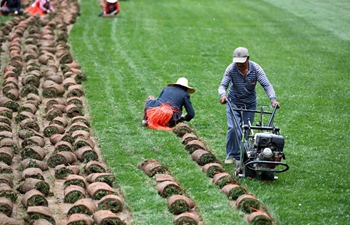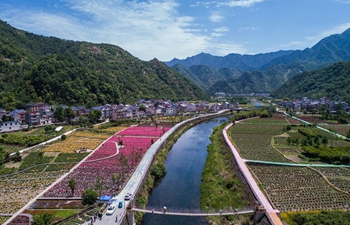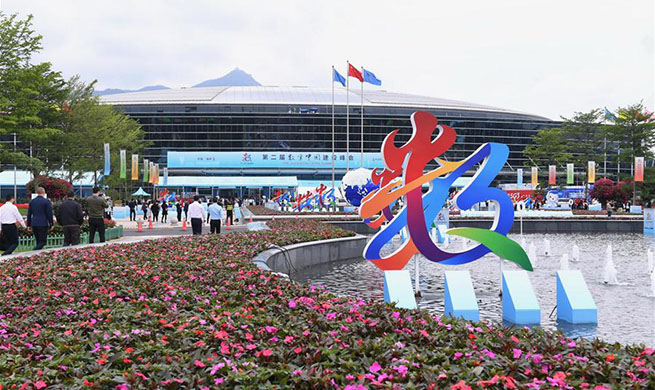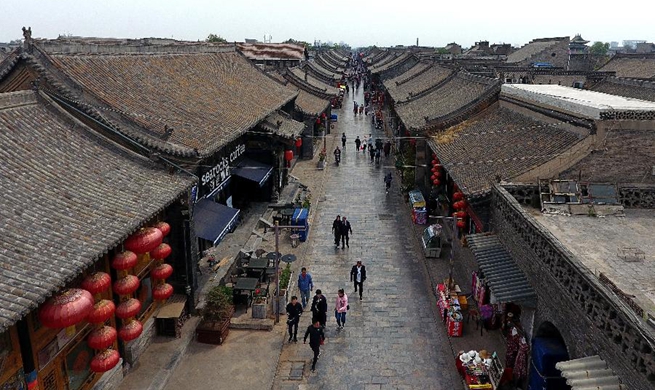HARARE, May 7 (Xinhua) -- The inaugural sub-regional elephant summit opened in Botswana's Kasane town on Tuesday, with President Mokgweetsi Masisi calling on countries in southern Africa to unite and take an active role in lobbying for adoption of international decisions that allow them to derive financial benefits from their wildlife conservation efforts.
The summit is being attended by leaders in the five-member Kavango-Zambezi Transfrontier Conservation Area (KAZA) and is aiming to raise awareness on the status of the African elephant, particularly in the southern Africa region.
It is also aiming to exchange ideas on human-elephant conflicts, tackle the legal and illegal trade of elephants and their products with a view to reaching consensus on how to address the challenges, state news agency New Ziana reported.
Southern Africa is home to the largest elephant population in the world, concentrated in the Kaza region made up of Angola, Botswana, Namibia, Zambia and Zimbabwe.
President Masisi said the region, which is under a CITES moratorium in trade in elephants and related products for nearly a decade, was in a catch-22 situation as its human and elephant populations were growing leading to a rise in animal-human conflict.
At the same time, the countries were not allowed to benefit from the resources through trophy hunting, trade in elephants, ivory and related products.
"The huge expanses of land reserved for wildlife and its associated management costs have come at the expense of human development that includes agriculture, education, health, provision of water and other infrastructure," Masisi said.
"We believe in a people centered approach to pursuing sustainable and economically inclusive solutions in the management of wildlife." he said.
Zimbabwean President Emmerson Mnangagwa, Edgar Lungu of Zambia and Hage Geingob of Namibia are attending the summit which is also being attended by experts in wildlife management.
Masisi said the ban in elephant trade had not stopped poaching of the animals, as well as natural death of elephants, which had seen ivory stockpiles growing over the years.
"Security and management of the sizeable ivory stocks, most of which came because of natural mortalities are a great cost to us," he said.
"The closure of legal ivory trade markets continues to create additional challenges to future efforts to dispose of these valuable stockpiles. There is no doubt that there is a need for deeper stakeholder conversations on this matter in an objective and realistic manner particularly taking cognizance of the realities of those who live with and among elephants," he said.
Growth in elephant populations was not only resulting in increasing deaths of humans killed by the animals, but also massive devastation of bio-diversity due to limited carrying capacity as well as destruction of other infrastructure.
Masisi said the impact of this conflict on communities trying to eke out a living cannot be underestimated and lamented that measures to reduce human-animal conflict required significant resources which are not always available due to other competing priorities.
"There should be no debate that our local communities need protection to secure their livelihoods and most importantly to participate in the conservation of these iconic species," he said.
"We cannot continue to be spectators while others debate and take decisions about our elephants. It is not by accident that our region is home to the largest population of elephants. Our conservation and management practices and successes are world class and we should not be shy to proudly so proclaim." he said.
Masisi also regretted that Africa had failed to come up with an agreed position on how it should benefit from its wildlife resources, especially elephants.













